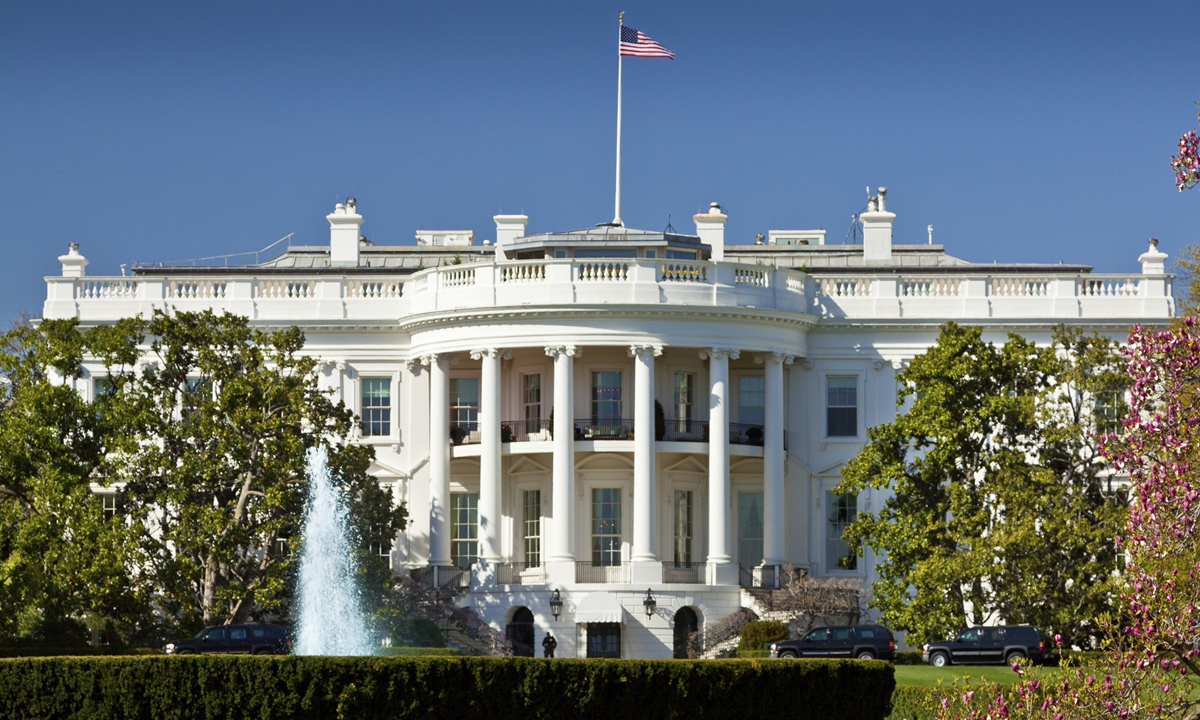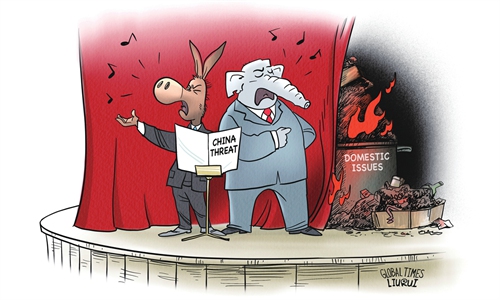
Recent polls show that majorities in the US don't want Biden and Trump to run in 2024. But these two are still engaged in the political race. Will people witness an "ultimate showdown" of the older generation of American politicians in the 2024 election? Why have the young politicians of the new generation in the US not yet taken important positions in both parties? Even some American media outlets cannot help but ask this question.
In terms of the presidential election, the Democratic Party had a precedent and tradition of having young political elites entering the White House after World War II. John F. Kennedy, Bill Clinton and Barack Obama all became US presidents in their 40s. Obama, born in the 1960s, was 47 years old in the 2008 election. Given the strong dissatisfaction of American voters with the financial crisis, two wars in the Middle East and the Republican Party, he won a sweeping victory both inside and outside the party.
In the 2016 election, Hillary Clinton, full of confidence and prepared to take over the Oval Office, unexpectedly lost to Trump. In 2020, the Democratic Party could only keep promoting Biden, who had the qualifications, experience and reputation to counter Trump. Influential young political forces within the Democratic Party have become increasingly scarce.
In both the 2016 and 2024 elections, some young competitors emerged within the Republican Party, but they were unable to compete with Trump. Federal senators Ted Cruz and Marco Rubio, who are extremely anti-China, are still considered "not populist enough." Vivek Ramaswamy, a 38-year-old Indian-American businessman, has not enough experience. Florida Governor Ron DeSantis, who was fiercely suppressed by Trump, dared not break with him. Former vice president Mike Pence and former New Jersey governor Chris Christie, who represent the establishment faction and adopt an "anti-Trump" stance, have no chance to win. Nikki Haley, former US ambassador to the UN, has decided to continue participating in the Republican Party primaries and tries to highlight her age advantage. However, it is difficult for Haley to counter Trump.
The decline of young politicians from both parties in recent elections is also related to the polarization of American politics and the design of the primary system. The lack of a bottom line in the fierce fighting and public opinion manipulation between the two parties has made the base voters of both sides see each other as enemies and feel that they cannot afford to lose. Democratic voters believe that Biden is the "only person in the party who can defeat and will defeat Trump again," while the other side believes that only Trump and his "Make America Great Again" movement can boost the economy, end overseas conflicts, defend border security and uphold conservative values. Both party members and voters need candidates with sufficient influence and symbolism. Therefore, for Biden and Trump, who are the current and former presidents, age is not the issue now.
On a broader political level within the US, there has been a constant struggle for the transition of power between the old and new generations. For instance, in every election, groups of young individuals are elected as members of Congress, governors and state legislators. Among the aspiring wealthy newcomers in politics, there are also many young faces.
This trend is driven by the generational shift in the American population. In 2021, the combined population of the "Generation X" (born between 1964 and 1980), "Millennials" (born between 1981 and 1996), and "Generation Z" (born between 1997 and 2012) accounted for over 60 percent of the total population in the US. This large population base and voter group will inevitably give birth to a new generation of American politicians.
Compared to the "Baby Boomer" generation (born between 1946 and 1964), which consists of a significant number of "old white males," the new generation is characterized by greater racial diversity, diverse values, an increase in female representation and a significant proportion of immigrants. These changes overall favor the Democratic Party in expanding its voter base and force the Republican Party to actively seek and attract more ethnic minorities and women. The possibility of having presidents from the post-1970s and post-1980s generations, a female president and another ethnic minority president will increase in the future.
Our world is undergoing accelerating changes unseen in a century, and the relationship between the US and the world is also facing significant changes. Both Biden and Trump were born around the end of World War II. Experiencing the "Golden Age" of the US in their childhood, witnessing the US' triumph in the Cold War in midlife and observing the country's decline in its later years, after enjoying the "unipolar moment," they now harbor anxiety, and are intolerant of other major nations rising to prominence. Although these two politicians from the post-1940s generation differ in political affiliation, ideology and style, they share common ground in adhering to cold war thinking, upholding American hegemony and striving to control the world.
It is difficult to predict whether the new generation of American politicians, especially those who may compete in future presidential elections, will be those who stubbornly adhere to conservative Cold War thinking, or rational and pragmatic figures like California Governor Gavin Newsom, or individuals from the business world like Elon Musk.
However, one thing is certain - in the current world where the Russia-Ukraine conflict, the Israel-Palestine conflict, group politics and great power competition are escalating, and where "decoupling" and "building walls and barriers" are prevalent, the role of the US as the sole superpower remains crucial. The choice of the winner of the 2024 US presidential election regarding strategies and policies will have significant implications for whether the world is heading toward more conflicts and a comprehensive cold war or toward cease-fire and restraint. This choice determines whether the torch passed on to future generations of Americans will be one that lights the way forward or ignites a powder keg in the world. It will not only affect the US but peace and stability around the world.
The author is deputy director and a research fellow of the Institute of American Studies, the China Institutes of Contemporary International Relations. opinion@globaltimes.com.cn

Photo: VCG
The current situation in the primary stage of the 2024 US presidential election indicates an increasing possibility of a rematch between former president Donald Trump, representing the Republican Party, and the incumbent Democratic President Joe Biden. As the oldest president in US history, Biden is 81 years old, while Trump, who swore to "take back" the country, is 77 years old.Recent polls show that majorities in the US don't want Biden and Trump to run in 2024. But these two are still engaged in the political race. Will people witness an "ultimate showdown" of the older generation of American politicians in the 2024 election? Why have the young politicians of the new generation in the US not yet taken important positions in both parties? Even some American media outlets cannot help but ask this question.
In terms of the presidential election, the Democratic Party had a precedent and tradition of having young political elites entering the White House after World War II. John F. Kennedy, Bill Clinton and Barack Obama all became US presidents in their 40s. Obama, born in the 1960s, was 47 years old in the 2008 election. Given the strong dissatisfaction of American voters with the financial crisis, two wars in the Middle East and the Republican Party, he won a sweeping victory both inside and outside the party.
In the 2016 election, Hillary Clinton, full of confidence and prepared to take over the Oval Office, unexpectedly lost to Trump. In 2020, the Democratic Party could only keep promoting Biden, who had the qualifications, experience and reputation to counter Trump. Influential young political forces within the Democratic Party have become increasingly scarce.
In both the 2016 and 2024 elections, some young competitors emerged within the Republican Party, but they were unable to compete with Trump. Federal senators Ted Cruz and Marco Rubio, who are extremely anti-China, are still considered "not populist enough." Vivek Ramaswamy, a 38-year-old Indian-American businessman, has not enough experience. Florida Governor Ron DeSantis, who was fiercely suppressed by Trump, dared not break with him. Former vice president Mike Pence and former New Jersey governor Chris Christie, who represent the establishment faction and adopt an "anti-Trump" stance, have no chance to win. Nikki Haley, former US ambassador to the UN, has decided to continue participating in the Republican Party primaries and tries to highlight her age advantage. However, it is difficult for Haley to counter Trump.
The decline of young politicians from both parties in recent elections is also related to the polarization of American politics and the design of the primary system. The lack of a bottom line in the fierce fighting and public opinion manipulation between the two parties has made the base voters of both sides see each other as enemies and feel that they cannot afford to lose. Democratic voters believe that Biden is the "only person in the party who can defeat and will defeat Trump again," while the other side believes that only Trump and his "Make America Great Again" movement can boost the economy, end overseas conflicts, defend border security and uphold conservative values. Both party members and voters need candidates with sufficient influence and symbolism. Therefore, for Biden and Trump, who are the current and former presidents, age is not the issue now.
On a broader political level within the US, there has been a constant struggle for the transition of power between the old and new generations. For instance, in every election, groups of young individuals are elected as members of Congress, governors and state legislators. Among the aspiring wealthy newcomers in politics, there are also many young faces.
This trend is driven by the generational shift in the American population. In 2021, the combined population of the "Generation X" (born between 1964 and 1980), "Millennials" (born between 1981 and 1996), and "Generation Z" (born between 1997 and 2012) accounted for over 60 percent of the total population in the US. This large population base and voter group will inevitably give birth to a new generation of American politicians.
Compared to the "Baby Boomer" generation (born between 1946 and 1964), which consists of a significant number of "old white males," the new generation is characterized by greater racial diversity, diverse values, an increase in female representation and a significant proportion of immigrants. These changes overall favor the Democratic Party in expanding its voter base and force the Republican Party to actively seek and attract more ethnic minorities and women. The possibility of having presidents from the post-1970s and post-1980s generations, a female president and another ethnic minority president will increase in the future.
Our world is undergoing accelerating changes unseen in a century, and the relationship between the US and the world is also facing significant changes. Both Biden and Trump were born around the end of World War II. Experiencing the "Golden Age" of the US in their childhood, witnessing the US' triumph in the Cold War in midlife and observing the country's decline in its later years, after enjoying the "unipolar moment," they now harbor anxiety, and are intolerant of other major nations rising to prominence. Although these two politicians from the post-1940s generation differ in political affiliation, ideology and style, they share common ground in adhering to cold war thinking, upholding American hegemony and striving to control the world.
It is difficult to predict whether the new generation of American politicians, especially those who may compete in future presidential elections, will be those who stubbornly adhere to conservative Cold War thinking, or rational and pragmatic figures like California Governor Gavin Newsom, or individuals from the business world like Elon Musk.
However, one thing is certain - in the current world where the Russia-Ukraine conflict, the Israel-Palestine conflict, group politics and great power competition are escalating, and where "decoupling" and "building walls and barriers" are prevalent, the role of the US as the sole superpower remains crucial. The choice of the winner of the 2024 US presidential election regarding strategies and policies will have significant implications for whether the world is heading toward more conflicts and a comprehensive cold war or toward cease-fire and restraint. This choice determines whether the torch passed on to future generations of Americans will be one that lights the way forward or ignites a powder keg in the world. It will not only affect the US but peace and stability around the world.
The author is deputy director and a research fellow of the Institute of American Studies, the China Institutes of Contemporary International Relations. opinion@globaltimes.com.cn


